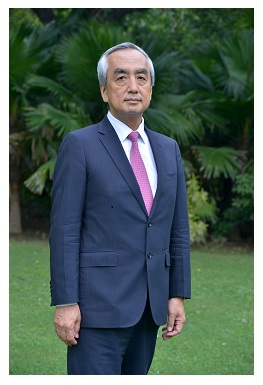
Greetings from the Embassy of Japan!
The year 2018 is almost drawing to a close. I am delighted that, during this year, the Japan-India relationship has further deepened and expanded in various spheres. Prime Minister Modi’s visit to Japan in October, in particular, symbolized the special and multi-layered Japan-India relationship.
Among all the annual alternate Prime Ministerial visits so far, Prime Minister Modi’s visit to Japan this time was the most historical and successful. Prime Minister Modi became the first foreign leader to be invited by Prime Minister Abe to his private villa by Lake Yamanaka in Yamanashi Prefecture. Prime Minister Modi also expressed his deep gratitude to Prime Minister Abe for the friendship and this gesture demonstrated the special and close relationship existing between the two leaders.
Prime Minister Modi’s visit this time was the fifth of the annual alternate Prime Ministerial visits, a tradition that has been established firmly by now. In these present times of increasingly uncertain global affairs, I am convinced that the Japan-India relationship provides stability and prosperity. Based on the two leaders’ common understanding that, “A strong India is in the interests of Japan, and a strong Japan is in the interests of India,” the Japan-India relationship exhibits complementarities in various respects. In addition, through the two leaders’ routinized discussions while glancing over a world map in front of them, the two leaders’ strategic views are converging even further. As proof of the convergence, Prime Minister Modi unequivocally said that the Japan-India relationship is a cornerstone of India’s Act East Policy. Also, the two leaders have affirmed on many occasions the commitment to resonating the Act East Policy and Japan’s effort toward a free and open Indo-Pacific.
During Prime Minister Modi’s Japan visit, there was significant progress in the area of security and defense. We can now say that, Japan-India relations, which earlier tended to be focused on economic cooperation, have achieved new development. In particular, we have made steady progress, including the commencement of negotiations on the Acquisition and Cross-Servicing Agreement (ACSA), and the signing of an implementing arrangement for deeper cooperation between the Japan Maritime Self-Defense Force and the Indian Navy. In addition, the two leaders agreed upon the launching of a “2+2” Ministerial Meeting. So far, India had such a framework only with the US. Through this meeting, we will further accelerate the process of deepening and expanding our cooperation in security and defense matters.
Regarding the economic matters as well, the two leaders reaffirmed that the two nations would strengthen their cooperation in various areas, including High Speed Rail. In particular, the Bilateral Swap Arrangement (BSA) of USD 75 billion, which is the largest ever for Japan, was highly acclaimed in India as an epitome of the closeness of Japan-India economic relations. In addition, 24 MOUs and MOCs were signed in various areas, such as digital, healthcare, and food processing. On the occasion of Prime Minister’s visit, the 5th Japan-India Business Leaders Forum between Japanese and Indian business delegations was held, and 57 Japanese companies announced their intent to invest in India. Through such intensified private sector interactions, I feel that the foundation of Japan-India relations is expanding ever before.
In the summit meeting, both leaders reaffirmed that people-to-people exchanges are at the core of Japan-India partnership. As mentioned above, while our cooperation in political and economic areas has progressed significantly, the potentials of exchanges in the fields of tourism, education, research and sports need to be nurtured more. To that end, drastic expansion of people-to-people exchanges needs to be promoted, taking advantage of the further relaxation of visa requirements for Indian nationals, announced at this year’s summit meeting. Also, in accordance with the MOC signed during last year’s summit meeting, the Japanese Language Teachers’ Training Centre was inaugurated on 23rd July. On 12th October, its first 3-months course was completed, and I attended both the inauguration as well as the completion ceremonies. Feeling happy for the new Japanese Language teachers, I promised my full support for expanding Japanese language education in India.
We at the Embassy of Japan in India are working vigorously every day to elevate this already-advanced relationship to an even higher level. I for one frequently meet with Indian government’s cabinet ministers and executives to advocate the importance of strategic cooperation between Japan and India and to seek actions on issues around the business environment of India that Japanese private sector representatives confront daily. I will also continue endeavouring to visit many states to facilitate deepening of our cooperation and exchanges.
The Embassy of Japan in India reaffirms our firm commitment to making every effort required for developing the Japan-India relationship in a multi-faceted manner. We hope that we can count on your support for our continued efforts towards achieving tangible results and fostering our bilateral friendship.
November, 2018
Kenji Hiramatsu
Ambassador of Japan to India
Ambassador's Message (04/2018)
Ambassador's Message (12/2016)
Ambassador's Message (05/2016)
|
